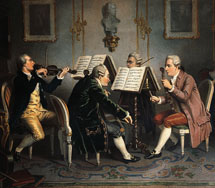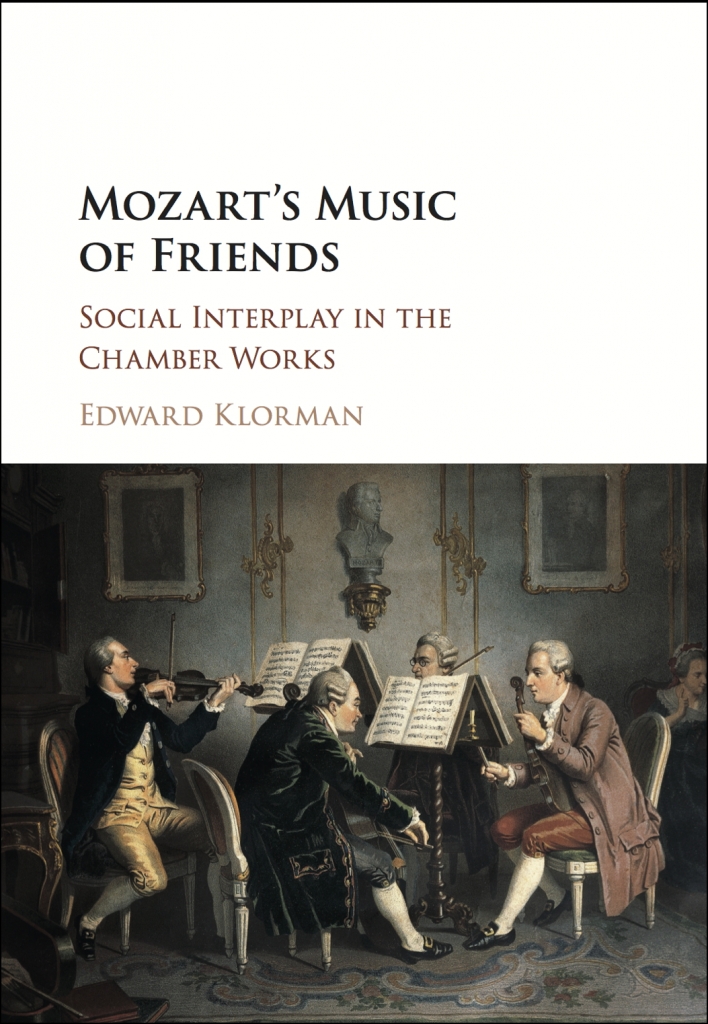
About Mozart’s Music of Friends
Winner, 2019 Society for Music Theory Emerging Scholar Award (Book Category)
Winner, 2017 Mozart Society of America Marjorie Weston Emerson Award
Winner, 2017 ASCAP Foundation Deems Taylor / Virgil Thomson Award
Winner, 2017 PROSE Award for Music & Performing Arts
Finalist, 2017 PROSE Award for Excellence in Humanities
In 1829 Goethe famously described the string quartet as “a conversation among four intelligent people.” Inspired by this metaphor, Edward Klorman’s study draws on a wide variety of documentary and iconographic sources to explore Mozart’s chamber works as “the music of friends.” Illuminating the meanings and historical foundations of comparisons between chamber music and social interplay, Klorman infuses the analysis of sonata form and phrase rhythm with a performer’s sensibility. He develops a new analytical method called multiple agency that interprets the various players within an ensemble as participants in stylized social intercourse – characters capable of surprising, seducing, outwitting, and even deceiving one another musically. This book is accompanied by Web Resources that include original recordings performed by the author and other musicians, as well as video analyses that invite the reader to experience the interplay in time, as if from within the ensemble.
Praise for Mozart’s Music of Friends
“Klorman’s love of his subject is truly infectious. Drawing on many contemporary quotes he paints a very vivid and human historical backdrop. We eavesdrop on composers, players, listeners and commentators puzzling over the composition and performance of classical chamber music from its birth. This is a work of impressive scholarship with a broad and deep awareness of musical theory and commentary through the centuries, but, above all, it makes a persuasive case for a mode of musical analysis that puts at its center the composer’s essential conception of the different parts in chamber music as multiple agents, affecting, surprising and even tussling with each other rhythmically, harmonically, contrapuntally and emotionally. In this way, reading his analyses can remind one of a good quartet rehearsal – a medium Klorman also knows very well from the quartet viola player’s seat.”
– Roger Tapping, Juilliard String Quartet
“To hear to Mozart’s chamber works on recordings, through mp3 players, or even in a concert hall is to experience them much differently than did listeners of the eighteenth century. As Klorman cogently explains, the primary intended audiences of these pieces were the performers themselves, for whom the notion of chamber music as a conversation was not merely a metaphor but an essential part of the artistic experience. Through penetrating historical and music analyses, Mozart’s Music of Friends helps vivify this wonderful music in a manner that is refreshingly new – or, I should say, in a manner that is over 200 years old, but has too long been set aside and forgotten.”
– L. Poundie Burstein, Hunter College and the Graduate Center, City University of New York
“Klorman fundamentally rethinks the social and behavioral bases for our understanding of a core repertoire. He works carefully through the logical implications of his key term, ‘multiple agency,’ using it to illuminate our understanding not just of texture, but also of elements such as meter, phrase syntax, and even musical form itself. Highly readable, entertaining, and thought-provoking.”
– W. Dean Sutcliffe, University of Auckland
“An appealing aspect of Klorman’s book is its willingness to play: to indulge in fantasy and language that mimic how musicians, whether of the eighteenth century or the twenty-first, might speak with one another about what they are doing. Without compromising the insightfulness or sophistication of his work, he is able to write cheerily about instrumental personas being chummy, coquettish, suave, and much more – far beyond what we’re used to reading in analytical music theory, but refreshing, perceptive, and invariably assuring us that we are in the company of a sensitive and knowledgeable musician.”
– Patrick McCreless, Yale University
“Mozart’s Music of Friends was born of a deeply musical impluse: Klorman wished to resolve a perceived dissonance between his experience as a violist playing chamber music and his education as a music theorist. The resolution of this dissonance is an adventurous new theory of multiple agency, by means of which Klorman deploys modern-day analytic methods to capture perceived social interactions in the chamber music of Mozart … Edward Klorman shows us in more ways then ever before why Mozart will always make new friends.”
– Scott Burnham, Journal of Music Theory [read complete review; journal access required]
“Social interaction is apparent in many levels of this delightful and thought-provoking monograph … Effectively organized, beautifully written, and informed throughout by extraordinary musical intelligence and sensitivity, Mozart’s Music of Friends is a major contribution to our understanding of Mozart’s chamber music and of eighteenth-century music in general.”
– John Rice, Society for Eighteenth-Century Music [read complete review]
“Edward Klorman’s superb monograph … is a remarkably original addition to the burgeoning music-theoretical literature on performance and analysis … Klorman’s authorial style … expresses incisive analytical insights with a freewheeling and charming whimsy … The book overall is best regarded as an artistic statement, and a highly compelling one at that.”
– Roger Graybill, Music Theory Online [read complete review]
“Edward Klorman has crafted a work that is a pleasure to experience, meticulously researched, eloquently written, and featuring elegant performers. Readers will feel welcomed into an exploration of convivial music-making, as Klorman places their theoretical understandings into a social, we all as historical, context. Scholars and performers of late eighteenth-century music will be grateful for Klorman’s fresh insights into familiar repertoire, and intrigued by his (multiple) perspectives on multiple agency.”
– Robert S. Hatten, Music Theory Spectrum [read complete review; journal access required]
“Ultimately, this book opens up the field of music analysis to an entirely new perspective, a perspective that is both historically grounded and experienced from a performer’s point of view. This perspective is likely to leave a significant imprint on the field of music analysis in the years to come.”
– Giorgio Sanguinetti, Music Analysis [read complete review; journal access required]
“Engaging, entertaining, and thought-provoking, this volume is informed by scholarly zeal as well as by a keen musical sensibility as Klorman traces the sociable intricacies of Mozart’s chamber-music textures from the dual standpoint of late eighteenth-century custom and present-day theoretical insight. The book thus makes a significant contribution to the Mozart literature, its usefulness enhanced by a wealth of quotations from pertinent sources as well as by an attractive, well-stocked website (mozartsmusicoffriends.com), where analytical videos help bring the author’s multiple-agency scenarios to life.”
– Floyd Grave, Newsletter of the Mozart Society of America [read complete review]
“The sociability of music-making is one of its most highly desirable (and oft-forgotten) attributes, one that musicology has steadily begun to address (and one may that continue). Klorman’s Mozart’s Music of Friends is a prominent and very welcome landmark in this progress.”
– John Irving, Journal of the Royal Musical Association [read complete review; journal access required]
“The insights he brings to bear on Mozart’s chamber repertory could only have been offered by someone with substantial background as a performer … The analytical chapters of this book are a tour de force … He is concerned to promote multiple readings and hearings of this music, which help us to celebrate this music’s subversiveness, subtlety, and – let’s face it – sheer fun.”
– Nancy November, Music & Letters [read complete review; journal access required]
“His scholarship and insightful historical and musical analyses are impressive throughout … Klorman undoubtedly succeeds in infusing analytical and music-historical scholarship with a performer’s sensibility, integrating more closely these diverse forms of musical engagement.”
– Robin Stowell, The Strad
“I am delighted to announce one of the most vivid and engaging books about Mozart’s music in recent years.”
– Petra Weber Kindhäuser, Ad Parnassum [read complete review]
“By establishing a conversation between these disciplines [musicology, music theory, and performance], Klorman is aiming to rekindle the vivid sense of repartee that animated chamber musicians in the time of Mozart … Klorman’s impressive accomplishment – to pull these different strains together and present them in clear, enjoyable prose – should interest musicians and scholars alike.”
– John Moran, Notes [read complete review; journal access required]
“Klorman is surely predestined to shed new light on this contested area, not merely because he is an erudite and communicative scholar and at the same time an exquisite violist, but also because he has been pursuing this particular area of research for several years, so that this book represents the result of an encompassing and multi-faceted engagement with the interface of performance and analysis.”
– Christian Utz, Music Theory and Analysis [read complete review; journal access required]
“Mozart’s Music of Friends is a marvellous book of history and theory by a scholar and a musician devoted to excellence, but also an open manual of musical practice for chamber music musicians. It is splendidly integrated with an essential selection of additional resources available online through mozartsmusicoffriends.com … for all the musicians to experience interactively and directly.”
– S. & L.M. Jennarelli, Mozart Circle [read complete review]


